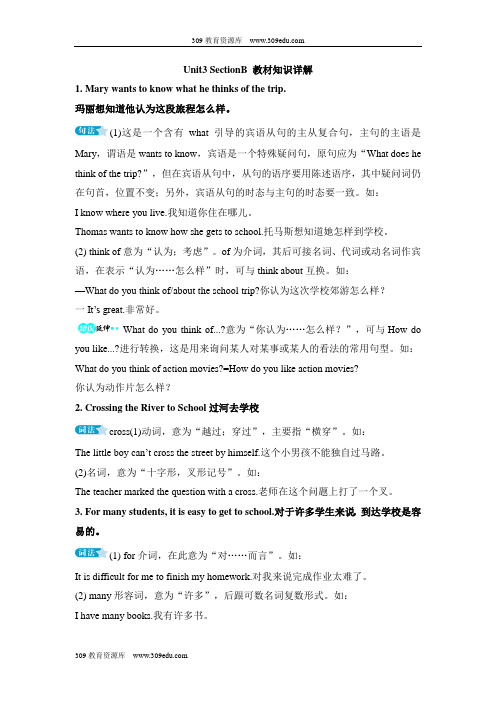(完整word版)人教版初中英语七年级下册Unit3SectionB教材全解
- 格式:doc
- 大小:101.52 KB
- 文档页数:9

初中英语七年级下Unit 3 Section B 2b 参考译文Do You Think You Will Have Your Own Robots?你认为你将拥有自己的机器人吗?1. When we watch movies about the future, we sometimes see robots. They are usually like human servants. They help with the housework and do jobs like working in dirty or dangerous places.1. 当我们观看关于未来的电影时,我们有时看到机器人。
它们通常像人类的仆人一样。
它们帮助做家务而且在脏的或者危险的地方工作。
2. Today there are already robots working in factories. Some can help to build cars, and they do simple jobs over and over again. Fewer people will do such jobs in the future because they are boring, but robots will never get bored.2. 现在已经有机器人在工厂工作。
一些机器人可以帮助制造汽车,而且它们可以一遍遍地重复做简单的工作。
将来几乎没有人做这样的工作因为它们很乏味,但机器人从不会觉得厌烦。
3. Scientists are now trying to make robots look like humans and do the same things as we do. Some robots in Japan can walk and dance. They are fun to watch. However, some scientists believe that although we can make robots move like people, it will be difficult to make them really think like a human. For example, scientist James White thinks that robots will never be able to wake up and know where they are. But many scientists disagree with Mr. White. They think that robots will even be able to talk like humans in 25 to 50 years.3 科学家现在正在努力制造一些看上去像人类一样,并且能像我们一样做事情的机器人。







人教版初中英语七年级下册Unit3SectionB教材全解Unit 3 How do you get to school?Unit 3 Section B教材全解1.bus stop 公共汽车站【重点注释】stop,此处用作名词,意为“车站;站点”。
例如:at a/the bus stop 在公共汽车站。
stop一般指的是小站,停车点,如路边的停车站点;station指的是总站,大型的车站,at a bus/train/subway station。
例如:They wait for Jim at the bus stop.他们在公共汽车站等吉姆。
Where si the bus station?公共汽车站在哪儿?吧。
Stop talking,please.请停止(正在)说话(这个事)。
They stop to smoke a cigarette.他们停下来(原来干的事),(然后)抽了根烟。
I must stop smoking.我必须戒烟了(我必须停止正在抽烟这个事)。
2.Mary wants to know where Bob lives.玛丽想知道鲍勃住在哪儿。
Mary wants to know what he thinks of the trip.玛丽想知道他(鲍勃)认为这段旅程怎么样。
【重点注释】①Mary wants to know where Bob lives.玛丽想知道鲍勃住在哪儿。
本句含有一个由连接词where引导的宾语从句。
在复合句中用作宾语的从句叫宾语从句。
无论主句是陈述句还是疑问句,宾语从句都必须使用陈述语序,即“主句+连词+宾语从句(主语+谓语+……)”句式。
如果主句的谓语动词是一般现在时,从句的谓语动词可根据需要,选用相应的任何时态。
例如:Please tell me who knows the answer.请告诉我谁知道答案。
Do you know which class he is in?你知道他在哪个班级吗?I don’t know when he will come back.我不知道他将何时回来。


Unit3 SectionB 教材知识详解1. Mary wants to know what he thinks of the trip.玛丽想知道他认为这段旅程怎么样。
(1)这是一个含有what引导的宾语从句的主从复合句,主句的主语是Mary,谓语是wants to know,宾语是一个特殊疑问句,原句应为“What does he think of the trip?”,但在宾语从句中,从句的语序要用陈述语序,其中疑问词仍在句首,位置不变;另外,宾语从句的时态与主句的时态要一致。
如:I know where you live.我知道你住在哪儿。
Thomas wants to know how she gets to school.托马斯想知道她怎样到学校。
(2) think of意为“认为;考虑”。
of为介词,其后可接名词、代词或动名词作宾语,在表示“认为……怎么样”时,可与think about互换。
如:—What do you think of/about the school trip?你认为这次学校郊游怎么样?一It’s great.非常好。
What do you think of...?意为“你认为……怎么样?”,可与How do you like...?进行转换,这是用来询问某人对某事或某人的看法的常用句型。
如:What do you think of action movies?=How do you like action movies?你认为动作片怎么样?2. Crossing the River to School过河去学校cross(1)动词,意为“越过;穿过”,主要指“横穿”。
如:The little boy can’t cross the street by himself.这个小男孩不能独自过马路。
(2)名词,意为“十字形,叉形记号”。
如:The teacher marked the question with a cross.老师在这个问题上打了一个叉。


人教版初中英语七年级下册Unit3SectionB教材全解Unit 3 How do you get to school?Unit 3 Section B教材全解1.bus stop 公共汽车站【重点注释】stop,此处用作名词,意为“车站;站点”。
例如:at a/the bus stop 在公共汽车站。
stop一般指的是小站,停车点,如路边的停车站点;station指的是总站,大型的车站,at a bus/train/subway station。
例如:They wait for Jim at the bus stop.他们在公共汽车站等吉姆。
Where si the bus station?公共汽车站在哪儿?吧。
Stop talking,please.请停止(正在)说话(这个事)。
They stop to smoke a cigarette.他们停下来(原来干的事),(然后)抽了根烟。
I must stop smoking.我必须戒烟了(我必须停止正在抽烟这个事)。
2.Mary wants to know where Bob lives.玛丽想知道鲍勃住在哪儿。
Mary wants to know what he thinks of the trip.玛丽想知道他(鲍勃)认为这段旅程怎么样。
【重点注释】①Mary wants to know where Bob lives.玛丽想知道鲍勃住在哪儿。
本句含有一个由连接词where引导的宾语从句。
在复合句中用作宾语的从句叫宾语从句。
无论主句是陈述句还是疑问句,宾语从句都必须使用陈述语序,即“主句+连词+宾语从句(主语+谓语+……)”句式。
如果主句的谓语动词是一般现在时,从句的谓语动词可根据需要,选用相应的任何时态。
例如:Please tell me who knows the answer.请告诉我谁知道答案。
Do you know which class he is in?你知道他在哪个班级吗?I don’t know when he will come back.我不知道他将何时回来。
【试题链接】I don’t know .A.where she comes from Bhow old is he C.when was he born (宾语从句要用陈述语序,选项B、C都是疑问语序。
根据句意“我不知道他来自哪里。
”可知答案为A。
)②Mary wants to know what he thinks of the trip.玛丽想知道他(鲍勃)认为这段旅程怎么样。
这是一个含有what引导的宾语从句的主从复合句,主句的主语是Mary,谓语动词时wants to know,宾语时一个特殊疑问句,原句应为“What does he think of the trip?”,但在宾语从句中,从句的语序要用陈述语序,其中疑问词仍在句首,位置不变;另外,宾语从句的时态与主句的时态要一致。
例如:I know where you live.我知道你住在哪儿。
Thomas wants to know how she gets to school.托马斯想知道她该怎样到学校。
Do you know what he weather is like today?你知道今天的天气怎样吗?③think of意为“认为,想出,想到,考虑”,of 是介词,其后可接名词、代词或V.ing形式,think of/about doing sth.意为“考虑干某事”,在表示“认为……怎么样?”时,可以与think about互换。
例如:——What do you think of /about how she gets to school?你认为这次学校郊游怎么样?——It’s great.非常好。
【比较记忆】(1)think of与think about这两个短语表示下列意义时,可以互换:①考虑eg: Don't think of/about me any more.不要再考虑我. ②对……有某种看法eg: What do you think of/ about the film 你认为那部影片怎么样?(2)think of表示下列意义时,一般不和think about换用. ①想要;打算eg: For a moment I thought of playing truant.我一时起了逃学的念头. ②想出;想到eg: Who thought of the idea 谁想出的那个主意③关心;想看eg: Lei Feng always thought of how he could do more for the people. 雷锋总是想着怎样多为人民做些事情. ④想起;说得eg:I can't think of his name.我想不起他的名字. (3)think about表示下列意义时一般不和think of换用. ①"回想"过去的事情. eg: We mustn't think about this matter any more.我们不许再想此事. ②"考虑"某事,某计划是否切实可行. eg: I'll think about your suggestion and give you an answer tomorrow. 我要考虑一下你的建议,明天给你答复.【拓展记忆】What do you think of the school trip?你认为这次学校郊游怎么样?What do you think of…?意为“你认为/觉得……怎么样?”,可与How do you like…?进行转换,这是用来询问某人对某事或某人的看法的常用句型。
例如:What do you think of/about action movies.=How do you like action movies.你认为动作片怎么样?课本1c的另外三句话:主句是?宾语从句是?宾语从句的连接词是?语序是?Mary wants to know how far he lives from his grandparents’home.玛丽想知道他住的地方离他祖父母家有多远。
Mary wants to know how he gets to his grandparents’home.玛丽想知道他是怎样到他祖父母家的。
Mary wants to know how long it takes to get to his grandparents’home玛丽想知道到他祖父母家需要多长时间。
【归纳记忆】宾语从句要记住三个要素:①选用合适的连接词;②宾语从句用陈述句语序;③一般主从句时态一致。
3.Crossing the River to School.过河去上学。
【重点注释】①cross作动词,意为“横越;越过;穿过”,主要表示在物体表面上“横穿”,如横过马路(cross the road)、过桥(cross the bridge)、过河(cross the river)等。
此处加上ing变成了动名词。
例如:The little boy can’t cross the street by himself.这个小男孩不能独自过马路。
Be carefull when you cross the street.过马路时要小心。
They crossed the river by boat.他们乘舟渡河。
②cross作名词,意为“十字形,叉形记号”。
例如:The teacher marked the question with a cross.老师在这个问题上打了一个叉。
连用表示“穿过,越过,横穿”的意思,go/walk/run/swim across…=cross(v.)…。
与cross基本同义,也是表示从物体表面经过。
例如:The Great Green Wall is acrossthe northwest of China.绿色长城横跨中国西北。
We can go across the freeze river. 我们可以横过这冻结了的大河。
I swam across the Changjiang River 20 years ago. 20年前我横渡了长江。
Look left and right before you go across the street. 过马路时要左右看。
【辨析记忆】across与through的区别:都是介词,在句中不能独立作谓语,必形成“十字”。
go/walk/run/swim across…=cross(v.)…。
而through指从某一物体的中间穿过,为在立体空间中的“穿过”。
常用于穿过沙漠、森林、门窗、村庄等,如:go through the forest“穿过森林”(从森林中间通过),go through the tunnel “穿过隧道”(从隧道中间通过)go across the street “穿过大街”(从马路一边到另一边)4.For many students,it is easy to get to school.对许多学生来说,到达学校是容易的。
But for the students in one small village in China,it is difficult.但是对于在中国的一个小村庄里的学生来说,是困难的。
【重点注释】①for介词,在此意为“对……而言”。
例如:It is difficult for me to finish my homework.对我来说,完成作业太难了。
It’s time for me to get up.我该起床了。
②many形容词,意为“许多”,后跟可数名词复数形式。
例如:I have many books.我有许多书。
There are many students in the classroom.教室里有很多学生。
【拓展记忆】①“many a +可数名词单数”谓语动词用第三人称单数形式。
例如:Many a worker often comest to our school.许多工人经常来我们学校。
②much也表示“许多”,但它修饰不可数名词。
例如:There is much water in the glass.玻璃杯里有许多水。
③many/much=lots of/a lot of.例如:He has many/a lot of/lots of beaubiful stamps.他有许多美丽的邮票。